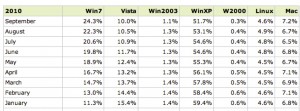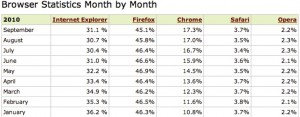Yesterday Google formally unveiled Chrome OS for netbooks, an operating system designed with the main purpose of surfing the web. Why another operating system, you might ask yourself. The world of operating systems for PCs and notebooks seems to be reasonably stable, with Windows in its different versions commanding above 90% market share, Apple’s OSX struggling to reach 6% and Linux, the “free” contendant not even reaching 2% after many years in the market. According to Google’s announcements during the introduction of the product , the interest of the company is to provide users with the fastest internet browsing experience possible.

In fact, Google says, if most of the time we use our computer is to surf the internet, and if most of our files are already in the “cloud” (our Gmail for one!) why do you need an operating system that allows to do mant things locally if you never use them?
So, they designed an operating system that will crank-up lighting fast, completely integrated with (indistinguishable from) its web browser Chrome, that will allow all of us to surf the net with ease, while simultaneously keeping all our files backed up in the cloud and accessible from any computer. And the best of all, Google does all this from the goodness of its heart, as it will be completely free, like the Chrome browser.

How much market share is Google going to obtain? Hard to tell, but if the evolution of browsers is an indication, Microsoft’s Explorer that in 2002 had a whooping 83.5% market share, dropped to 31.1% in September 2010, while Chrome has been climbing month after month to a sizable 17.3%. It is obvious, and everybody in the industry knows it, that operating systems are conceptually different from browsers due to its strong network effects, and that its market share resilience stems not from its inherent virtues, but from the applications that run on it. Extending the platform has been the mantra for operating system developers, and Microsoft in particular, since the early ages of PCs. Except for some rare cases; people buy an operating system for the applications that run on it, not for its inherent virtues.

Browsers have been able to fight a battle for market share by sporting their functionalities and its branding because what “runs” on browsers are web pages, and these, fortunately, run more and more on open standards. And these standards are the ones providing the network effect, and thus allowing for a level playing field in the browser “market.” How will Chrome OS be able to break the network effect of Windows? For starters, Google is providing a suit of applications that will run on its operating system much in the likes of the iPad applications, with an Appliation Store included. If Google’s vision is right and users will be in an “always connected” world, and the numbers and functionality of its applications is wide enough, there is no doubt that Chrome OS will make a dent on the Windows dominance.
According to the latest prediction of Gartner Research, “media tablets are expected to displace around 10% of the PC units by 2014” and this is considering only the iPad and Android “browse from your coach in the living room” devices. I personally believe that these are extremely conservative estimates. And consider that this is only the consumer market. When we add as Windows displacement factor the very large percentage of PCs in the business world that only run a browser and some very basic office functionalities that we can find in cloud-based applications, the probability that we will see a completely different operating system market share landscape by 2014 is very high.
And why is Google doing all this for free? As we all know, there is no free lunch, only different ways to pay for it. Google strives to create an ecosystem telecommunications-hardware-software that is as cheap as possible for the final user so that they have more income available to surf longer and purchase content. WIth more traffic, Google can extract rents from the business it has perfected to the limit: advertising. Google cannot afford (1) expensive telecommunications for the final user, and thus its efforts to introduce competition among the operators, and (2) expensive hardware, and thus its efforts to provide a free operating system for mobiles and tablets to induce competition in the handset market driving prices down against the dominant Apple, and now the Chrome OS to be able to reduce the $60 Microsoft cashes in form the price of your next computer. Developments in the next few months will help us see with more clarity what the future will look like for Google, Microsoft, and Apple in the battle for the slice of software between us and the Net.



The shipping versions of Chrome OS notebooks should be faster than the poky Cr-48 test bed.